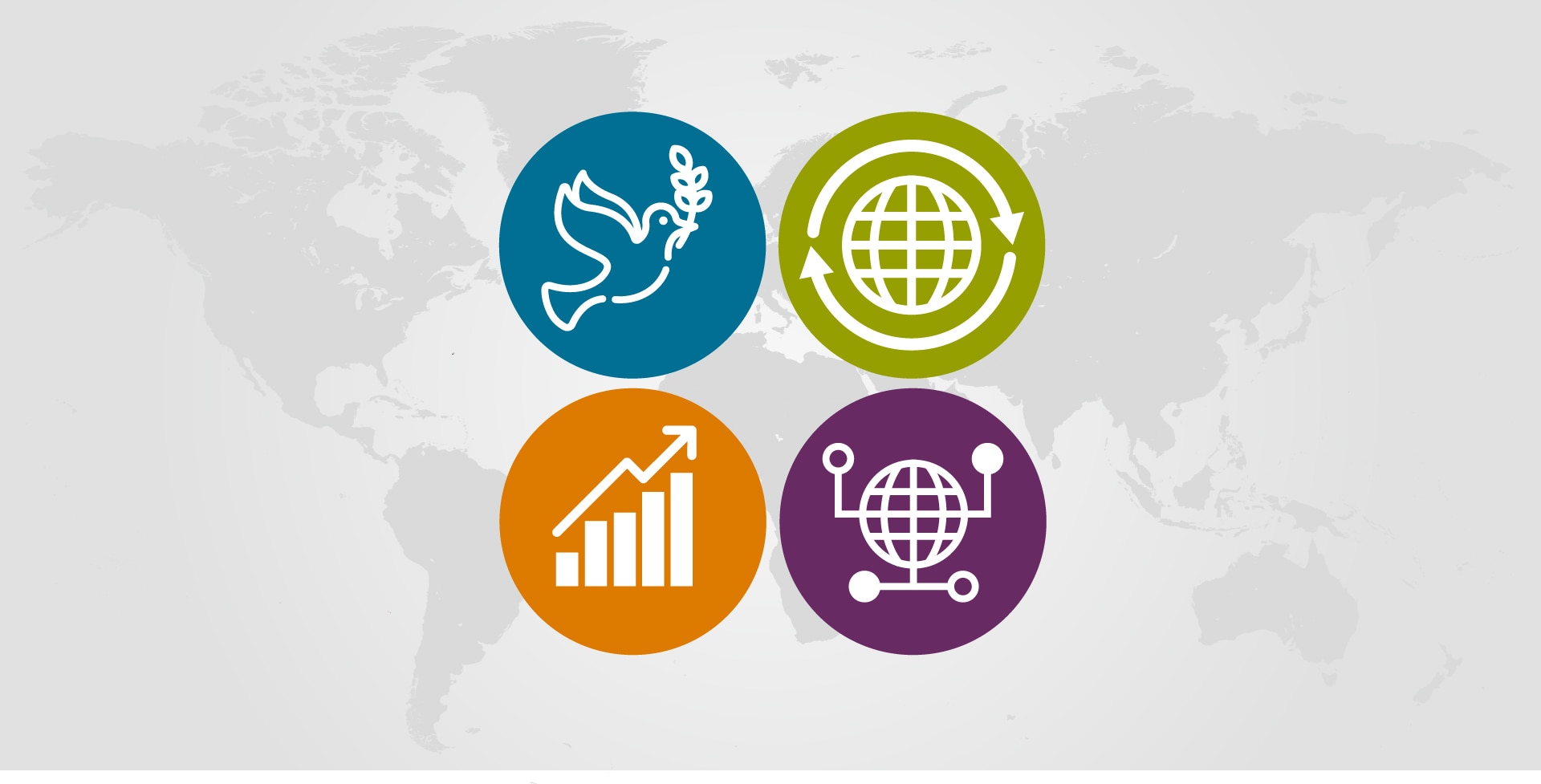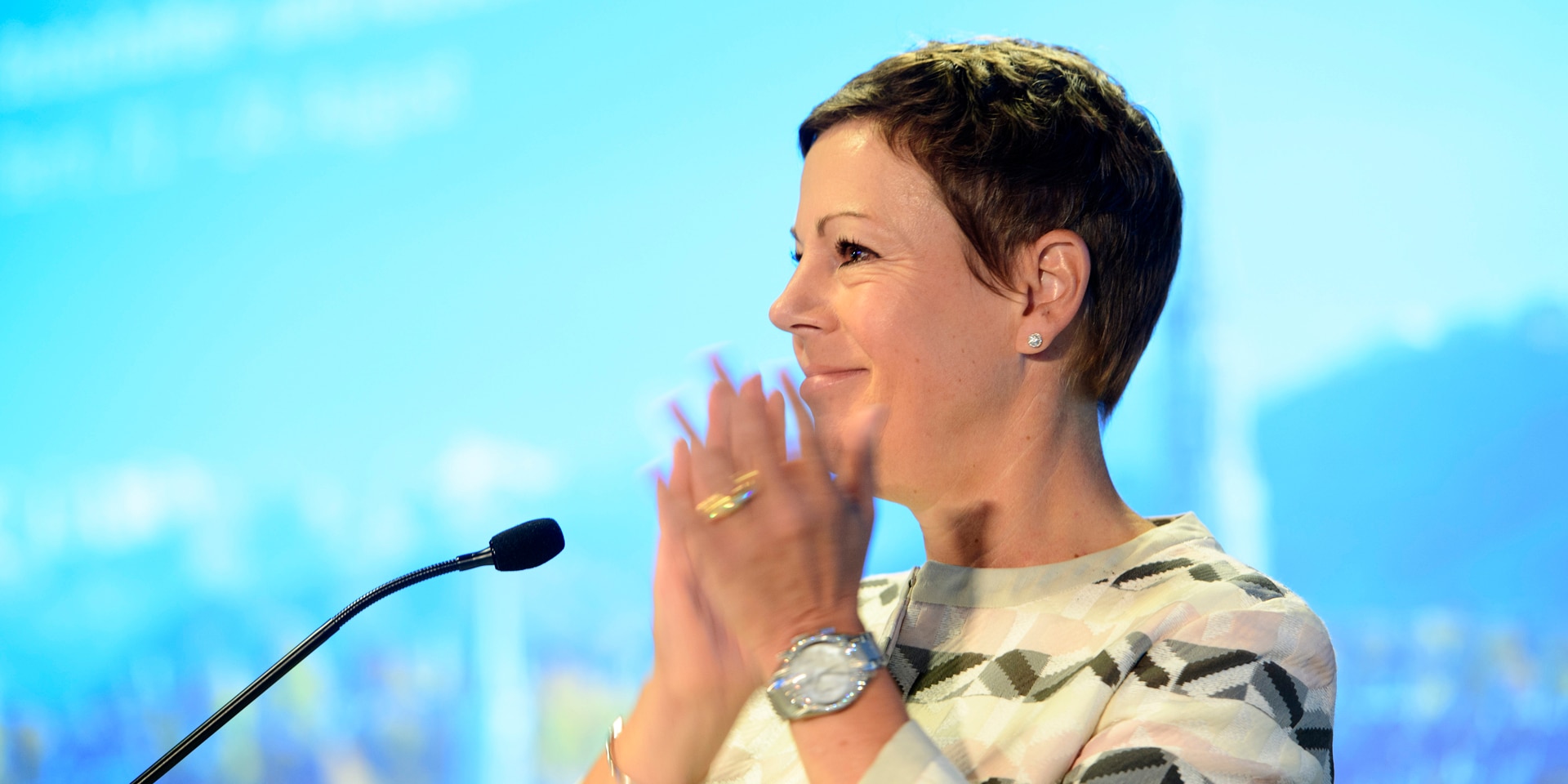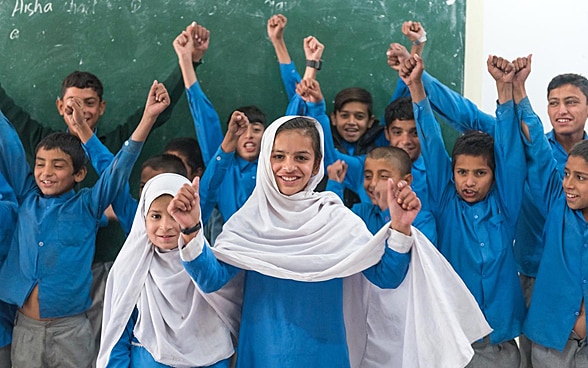Working for Switzerland and its citizens from abroad
A well-functioning external network is key to providing assistance to Swiss nationals abroad, maintaining relations with the countries concerned and safeguarding Switzerland's interests. A crisis like the COVID-19 pandemic puts enormous pressure on Switzerland's external network. Flexibility, innovation and solidarity allow Switzerland's representations abroad to continue to work effectively. Swiss external network staff share their experiences.
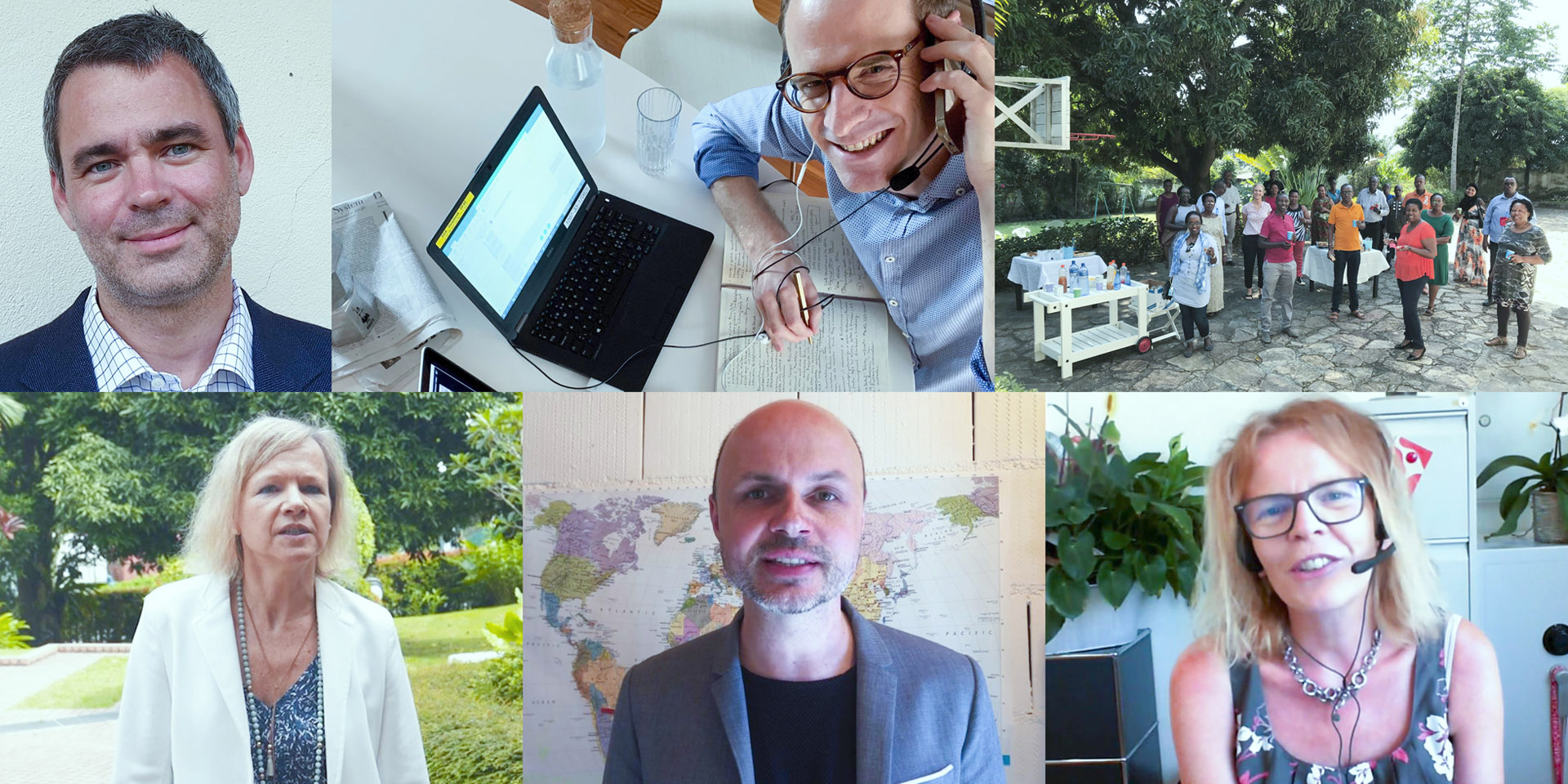
Six members of the FDFA's external network: Ruben Begert, Thomas Baumgartner, Cédrine Beney (with colleagues in Burundi), Regula Leuenberger, Michael Schweizer and Jocelyne Berset (from left to right). © FDFA
Ruben Begert is the regional security adviser for Central Africa at the Swiss embassy in Yaoundé, Cameroon. Thomas Baumgartner is head of diplomatic affairs at the Swiss embassy in Dhaka, Bangladesh. Cédrine Beney is director of the Swiss cooperation office in Burundi. All three work for the Federal Department of Foreign Affairs thousands of kilometres apart from one another and just as far from the Federal Palace.
The highly contagious and aggressive microscopic virus that has swept across the world has turned their daily lives upside down. They all agree that the coronavirus health crisis has posed an enormous challenge for their representations. Yet all three also report that solidarity, flexibility and effective organisation have enabled them to continue working and providing uninterrupted services.
Coordinating efforts internationally and working locally
We are stronger together, as the saying goes. Ruben Begert, Thomas Baumgartner and Cédrine Beney also point out that the Swiss external network is a vast platform driven by innovation and solidarity. In times of crisis such as the COVID-19 pandemic, the strengths of Switzerland's external network enable FDFA staff to find solutions and move forward.
In Cameroon, Ruben Begert explains that Switzerland's repatriation operation was only possible thanks to the hard work, joint efforts and mutual support of every member of the network: "Because all of us had to take on new tasks and the entire operation was an example of teamwork, because we had to work more closely than ever before with our colleagues at head office, and because it was evident that building and maintaining a large network of relationships ultimately pays off, the organisation of the repatriation flights will long be remembered." Diplomacy is also important in such a crisis, notes Begert, adding that the embassy in Yaounde could not have provided the services it did without "its excellent relations with the Cameroonian authorities and other representations as well as active engagement on the ground."
Speaking from Bangladesh, Thomas Baumgartner agrees: "Neither the repatriations, nor the support for Swiss companies nor the rapid delivery of humanitarian aid would have been possible without our extensive network of contacts. These relationships can only be established and maintained locally in direct contact with people. And Switzerland's presence is also an expression of our solidarity, especially in these difficult times".
In Burundi, one of the poorest countries in the world, solidarity was also crucial. "The support of our colleagues in Bern, Nairobi, Kigali and elsewhere was vital in enabling us to stay the course no matter what we were facing," says Cédrine Beney. In the midst of the pandemic, Burundi faced a tense security situation following the death of its long-term president just weeks after an election to replace him. In Bujumbura, it was feared that the Swiss representation, which houses the Swiss consular agency and the Swiss cooperation office, would have to close temporarily, and staff members were falling ill. The representation nonetheless continued to provide uninterrupted consular assistance, helped Swiss citizens to return to Switzerland, extended its portfolio of cooperation programmes, and implemented Switzerland's foreign policy in Burundi. "We rose to all sorts of challenges on all fronts. Our team remained operational even in the depths of the crisis," explains Beney.
Working effectively in a wide variety of situations
Working methods were reassessed. The representations had to adapt to the lockdown, social distancing and other restrictions which were put in place during the crisis and were being changed from day to day. "We are working flat out to adapt our strategies, plans and projects to these new circumstances," explains Thomas Baumgartner.
Ruben Begert writes that the work had to be "reinvented". The embassy team worked in shifts and from home. "The flexibility of every member of the team was perhaps the most striking aspect. Despite the precarious health situation, the embassy never stopped operating. We were able to continue implementing Switzerland's foreign policy, carrying out humanitarian work and providing consular services by splitting up into two teams, one working from home and the other in the representation," notes Begert.
Cédrine Beney explains: "We have had to constantly adapt to the changing situation and risks. Our team's versatility and solidarity have definitely been key assets during this exceptionally difficult period."
FDFA staff share their experiences in Brazil, Singapore and Italy
Regula Leuenberger, head of consular services at the Swiss embassy in Singapore, Michael Schweizer, deputy head and consul at the Swiss consulate general in São Paulo, and Jocelyne Berset, head of operations and consul at the Swiss consulate general in Milan, explain that the COVID-19 situation dramatically altered daily life in their representations. Everyone has had to adapt and be innovative in order to continue providing consular assistance and other services for Swiss nationals and to be able to carry out all their other duties. In this video they share their experiences from Brazil and Italy.
Did you know?
Many people rely on embassies and consulates to obtain visas or passports. Yet Switzerland's 167 or so representations do much more than provide these two services. The external network comprises embassies, consulates general, Swiss cooperation offices and Swiss missions to the UN and international organisations.
The representations work towards the common goals set out in the Federal Council's foreign policy strategy: to provide a wide range of services for Swiss nationals abroad, safeguard Switzerland's interests and promote the country's image worldwide. The remit of this vast network of representations also comprises, among other tasks, consular services, information and communication, bilateral and multilateral diplomacy, development aid, humanitarian aid, and defending human rights around the world.
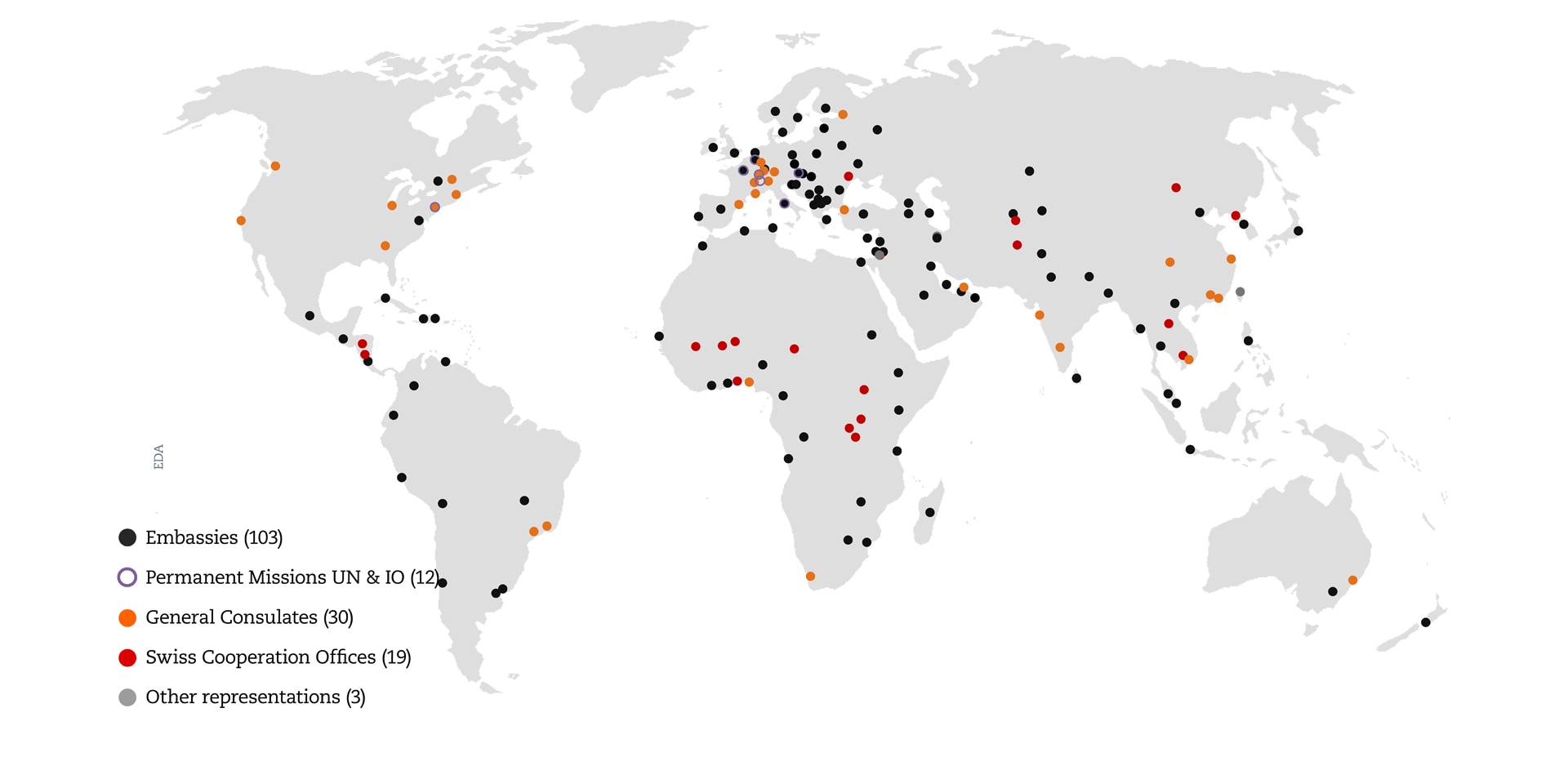
Facts and figures
- Switzerland has an extensive network of 167 representations abroad, including 103 embassies, 30 consulates general, 19 Swiss cooperation offices, and 12 permanent missions representing the country at the UN and international organisations.
- Swiss representations abroad are staffed on a permanent basis to ensure that they can always carry out their tasks and provide uninterrupted services.
- Switzerland's external network is constantly being adapted.
- Its activities are defined in the 2020–23 foreign policy strategy adopted by the Federal Council.
- The FDFA has a mandate to provide a public service to Swiss citizens abroad which is laid down in the Organisation Ordinance for the Federal Department of Foreign Affairs and the Swiss Abroad Act.
- In 2019, the Swiss resident population made more than 16 million trips abroad with at least one overnight stay. Some 770,000 Swiss nationals live abroad.
- Certain services can only be provided by the FDFA from its head office in Bern. The FDFA Helpline, which operates around the clock, handled over 45,000 telephone and email enquiries during the peak of the COVID-19 crisis. However, other services, including field diplomacy, development aid programmes and services for Swiss citizens abroad, can only be provided locally.

